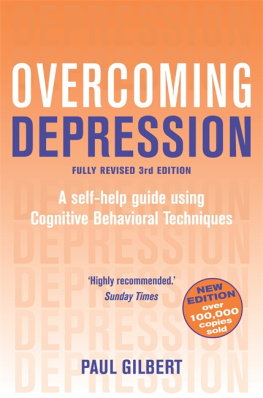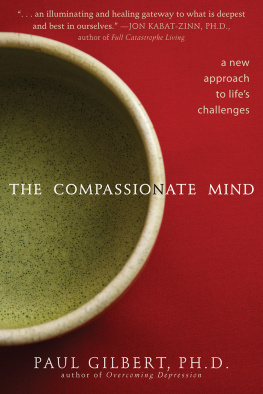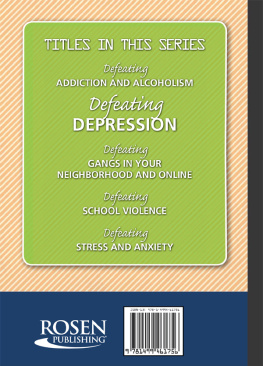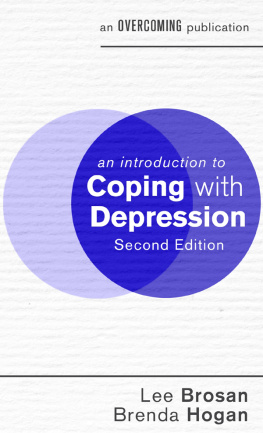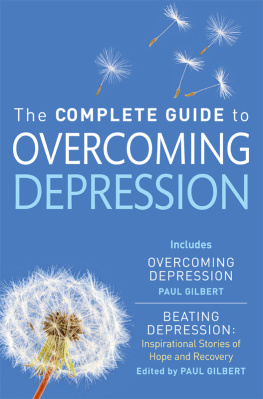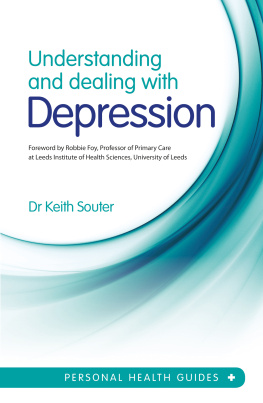Paul Gilbert is Professor of Clinical Psychology at the University of Derby and Director of the Mental Health Research Unit, Derbyshire Mental Health Trust. He is a visiting professor at the Universities of Fribourg (Switzerland) and Coimbra (Portugal) and a fellow of the British Psychological Society. Between 2002 and 2003 he was President of the BABCP. Paul is the author of The Compassionate Mind, also published by Constable & Robinson.
The aim of the Overcoming series is to enable people with a range of common problems and disorders to take control of their own recovery program.
Each title, with its specially tailored program, is devised by a practising clinician using the latest techniques of cognitive behavioral therapy techniques which have been shown to be highly effective in changing the way patients think about themselves and their problems.
The series was initiated in 1993 by Peter Cooper, Professor of Psychology at Reading University and Research Fellow at the University of Cambridge in the UK whose original volume on overcoming bulimia nervosa and binge-eating continues to help many people in the USA, the UK and Europe.
Titles in the series include:
OVERCOMING ANGER AND IRRITABILITY
OVERCOMING ANOREXIA NERVOSA
OVERCOMING ANXIETY
OVERCOMING BODY IMAGE PROBLEMS
OVERCOMING BULIMIA NERVOSA AND BINGE-EATING
OVERCOMING CHILDHOOD TRAUMA
OVERCOMING CHRONIC FATIGUE
OVERCOMING CHRONIC PAIN
OVERCOMING COMPULSIVE GAMBLING
OVERCOMING DEPERSONALIZATION AND FEELINGS OF UNREALITY
OVERCOMING DEPRESSION
OVERCOMING GRIEF
OVERCOMING INSOMNIA AND SLEEP PROBLEMS
OVERCOMING LOW SELF-ESTEEM
OVERCOMING MOOD SWINGS
OVERCOMING OBSESSIVE COMPULSIVE DISORDER
OVERCOMING PANIC
OVERCOMING PARANOID AND SUSPICIOUS THOUGHTS
OVERCOMING RELATIONSHIP PROBLEMS
OVERCOMING SEXUAL PROBLEMS
OVERCOMING SOCIAL ANXIETY AND SHYNESS
OVERCOMING TRAUMATIC STRESS
OVERCOMING WEIGHT PROBLEMS
OVERCOMING WORRY
OVERCOMING YOUR CHILDS FEARS AND WORRIES
OVERCOMING YOUR CHILDS SHYNESS AND SOCIAL ANXIETY
OVERCOMING YOUR SMOKING HABIT
All titles in the series are available by mail order.
Please see the order form at the back of this book.
www.overcoming.co.uk
OVERCOMING
DEPRESSION
A self-help guide using
Cognitive Behavioral Techniques
PAUL GILBERT
ROBINSON
London
Constable & Robinson Ltd
3 The Lanchesters
162 Fulham Palace Road
London W6 9ER
www.constablerobinson.com
First published in the UK by Robinson,
an imprint of Constable & Robinson Ltd 1997
Copyright Paul Gilbert, 1997, 2000, 2009
The right of Paul Gilbert to be identified as the author of this work has been asserted by him in accordance with the Copyright, Designs and Patents Act, 1988.
All rights reserved. This book is sold subject to the condition that it shall not, by way of trade or otherwise, be lent, re-sold, hired out or otherwise circulated in any form of binding or cover other than that in which it is published and without a similar condition including this condition being imposed on the subsequent purchaser.
A copy of the British Library Cataloguing in
Publication Data is available from the British Library.
Important Note
This book is not intended as a substitute for medical advice or treatment. Any person with a condition requiring medical attention should consult a qualified medical practitioner or suitable therapist.
ISBN 978-1-84901-066-5
Printed and bound in the EU
1 3 5 7 9 10 8 6 4 2
Table of contents
Acknowledgments
The Mental Health Research Unit was set up in 1996 as a joint project between the University of Derby and what is now the Derbyshire Mental Health Services NHS Trust. I am extremely grateful for their vision and support in our work. The Mental Health Research Unit continues to seek research funds and engage in research into mental health difficulties. There are many people in my unit I would like to thank. Special thanks go to Corinne Gale (research psychologist and research coordinator) and Kirsten McEwan (research psychologist and statistician) for their extraordinary dedication, hard work and wonderfully friendly dispositions. Special thanks also go to Lesley Futter for her hard work with this manuscript and with the Mental Health Research Unit. Thanks also to our super-efficient Kelly Sims who has just joined us. We are deeply indebted to Keith Wilshere for his skilful management of our unit, encouragement on the compassion projects, and keeping us all afloat, as well as his brilliant bass playing and technical skills for Still Minds.
Thanks to Sue Procter for her help in our first study of compassion-focused group therapy. Thanks also to psychologists Sharon Pallant, Michelle Cree and Andrew Rayner for their compassion-focused in-patient work. Two years ago some colleagues and I also set up a charity which has the mission statement To promote well-being through the scientific understanding and application of compassion. If you go to the website at www.compassionatemind.co.uk, you will find lots of information, and you can download several of our publications. Key people have been fundamental to the development and support of this project, and special thanks go to my friend of over 30 years, Chris Gillespie. I would also like to thank the other board members: Chris Irons, Ken Goss, Mary Welford, Ian Lowens, Deborah Lee, Thomas Schroder and Jean Gilbert. Thanks to Diane Woollands for her skilful management of the website and board.
The University of Derby Psychology Department has been supportive, and thanks go to James Elander and in particular Frances Maratos for her support and expertise in fMRI, and enthusiasm for further studies on compassion with the universities of Aston and Glasgow. We are very excited about these studies; find out more on our website. Thanks also to Michael Townend for his enthusiasm and support for compassion-focused therapy. I would also like to thank Bob Leahy of the International Association of Cognitive Behavioral Therapists for his friendship and scholarship. I am also delighted to be able to thank the British Association for Behavioural and Cognitive Psychotherapies for their openness, support, friendliness and putting up with a quirky, evolutionary, archetype-and compassion-focused dude like me.
Nick Robinson and his staff at Constable & Robinson have been tireless in working to advance this series. They have been lovely to work with and special thanks go to Nick himself, Fritha Saunders for her soothing, and Eryl Humphrey Jones.
Last but of course not least, many thanks to my supportive family, Jean, Hannah and James, perhaps the biggest antidote to depression.
I would like to dedicate this book to all depressed people: may compassion help you light a candle in your darkness. I offer my immense gratitude to all those depressed people who have been honest and open and have educated and guided me in my therapeutic efforts.
Foreword
Many, perhaps the majority, of those who go to see their family doctor have some type of psychological problem which makes them anxious or unhappy. There may be a fairly obvious reason for this the loneliness of widowhood or the stresses of bringing up a family or it may be that their mental state is part of their personality, something they were born with or a reaction to traumatic experiences in their lives. Despite being so common, I soon discovered after starting in general practice over ten years ago that this type of mental disturbance (usually described as a neurosis to distinguish it from the psychosis of those with a serious mental illness like schizophrenia) is particularly difficult to deal with. What are the options? Well, there are always drugs minor tranquillizers, antidepressants and sleeping pills. It is certainly easy enough to write a prescription and more often than not the patient feels a lot better as a result, but there is no getting away from the fact that drugs are a chemical fix. Sometimes this is all that is necessary to tide someone over a difficult period, but more usually the same old problems recur when the drugs are discontinued.
Next page
